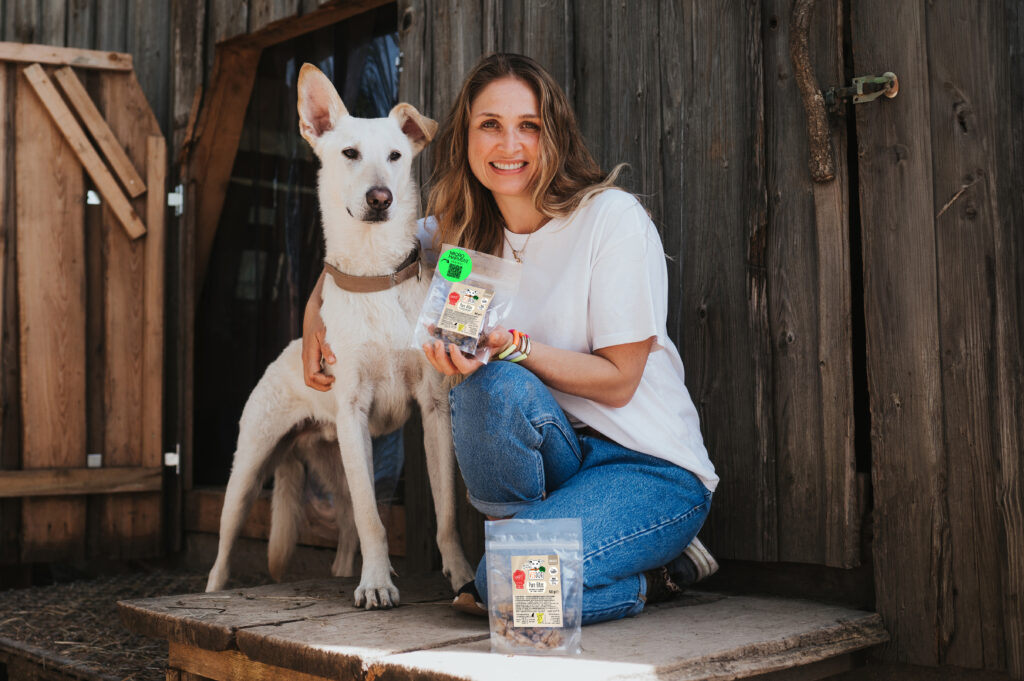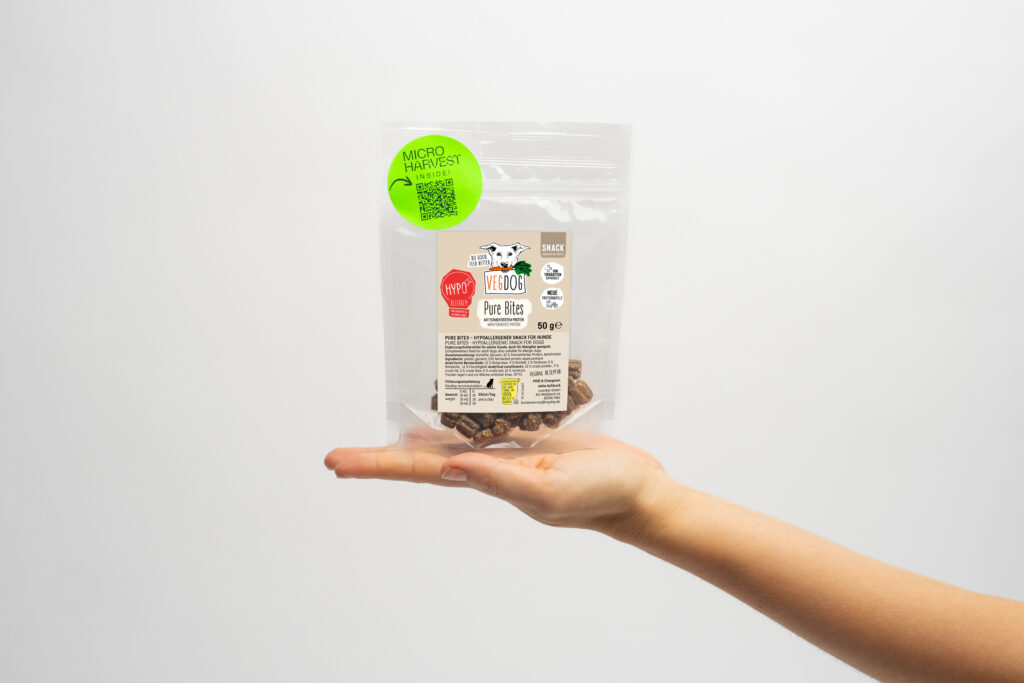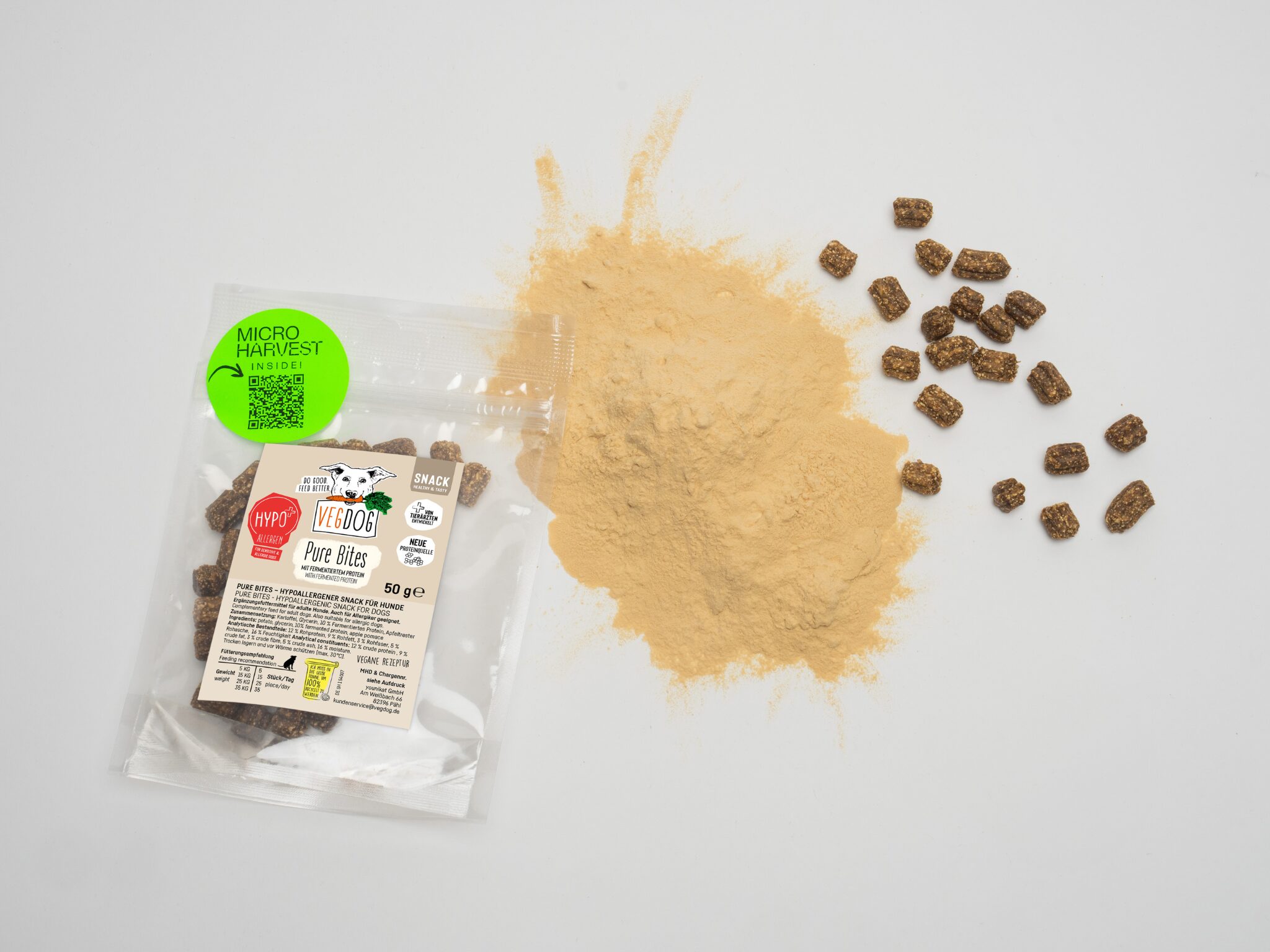VEGDOG Debuts Dog Treats with MicroHarvest’s Hypoallergenic Microbial Protein Ingredient
4 Mins Read
German startups VEGDOG and MicroHarvest have teamed up to release a microbial protein-based treat for dogs, which boasts environmental superiority and supports pets with allergies.
Pet food brand VEGDOG will soon roll out Pure Bites, a new line of dog treats made using MicroHarvest’s biomass-fermented microbial protein.
The snack – which is said to be much more climate-friendly than meat-based dog food – combines the protein ingredient with potatoes and apple pomace, and will be unveiled next month at the 2024 Pet Food Forum at Interzoo Europe in Nuremberg, Germany (May 6).
“Our goal at VEGDOG is to show dog owners that they do not have to rely on meat-based products to feed their pets,” said VEGDOG founder and CEO, Tessa Zaune-Figlar. “With this modern approach and our high-quality, healthy and tasty products, we have been able to pioneer a new market. By collaborating with our partner MicroHarvest, we are opening a new chapter and bringing to market a promising snack that demonstrates our ability to innovate.”
Breaking into the hypoallergenic dog food space

The microbial protein possesses hypoallergenic properties that make it particularly suitable for canines that can’t tolerate conventional protein sources. While estimates vary, between 1% and 8% of dogs have food allergies, making hypoallergenic foods essential for these pets. The market for these products is only set to grow, reaching $22B by 2032, according to one forecast.
The companies argue that the high tolerance and digestibility, plus the taste credentials, of the new dog treats are what make them attractive to dogs with severe allergies or intolerances. They note that there’s also a case for using the Pure Bites in veterinary practice.
“Sustainability is becoming increasingly important for pet food shoppers,” noted MicroHarvest co-founder and CEO Katelijne Bekers. “Still, there are other purchase drivers to consider, like palatability, digestibility, as well as specific nutritional benefits, like low-fat content; these are all benefits that our protein over-delivers on.”
To prove the concept, MicroHarvest partnered with Wageningen University in the Netherlands and conducted an acceptance study for its protein among 1,162 UK and German dog owners (these are the two largest markets for premium dog food in Europe). In the survey, 77% of respondents indicated a willingness to buy microbial protein dog treats, and 78% said the same for complete dog food containing the protein.
“Our partnership with VEGDOG, coupled with the results of our consumer research, demonstrates the potential for microbial ingredients like ours to offer competitive protein alternatives to the pet food industry,” said Bekers.
Additionally, MicroHarvest carried out a palatability study, where the acceptance rate for microbial protein treats was 85%, compared to 75% for those made with poultry. This validates the viability of the protein as a nutritious treat, according to Ally Motta, an animal nutritionist and application specialist at the startup. “Testing has confirmed that our protein ingredient has a stable nutritional profile containing all the essential amino acids for dogs,” she said.
Pilot plant enables scalable production of sustainable protein

As Bekers alluded to, sustainability is becoming important to consumers. Pet food has a large climate footprint – globally, dog and cat food emit around 64 million tons of carbon per year – that’s the equivalent of over 13 million cars. In fact, if cats and dogs were considered their own nation, they would rank as the world’s fifth-largest meat-consuming entity.
MicroHarvest’s microbial ingredient generates 1.4kg of CO2e per kg – for context, beef production emits as much as 99kg for the same amount of food. The startup argues that the microbial protein has an equivalent climate impact as insect proteins, and surpasses plant proteins on that metric.
Instead of using yeast or mycelium as its base, the company is using microbes from the same bacteria found in foods like kimchi, kefir and sauerkraut. It uses a process that leverages biomass fermentation to produce ingredients with 60% raw protein within 24 hours, making it a highly scalable and consistent solution.
To accelerate production, the company opened a 200 sq m pilot plant in Lisbon last year. “This pilot plant serves as tangible evidence of the scalability of our process,” MicroHarvest CTO Luísa Cruz said at the time. “With a lower investment when compared to alternative technologies, and within a mere 200 square meters, we can achieve a daily production of 25 kg.”
“We are constantly searching for innovative protein sources that benefit our dogs as well as our planet. It is of high importance to us to formulate our products based on scientific evidence,” said Carla Steffen, R&D head at VEGDOG, which has raised €3.5M in total funding. As the microbial protein of MicroHarvest is proven to be highly digestible, palatable and sustainable, it ticks all of these boxes.”
Apart from pets, MicroHarvest – which recently became the first biomass fermentation player to join the Food Fermentation Europe coalition – is also working on developing livestock and aquaculture feed applications for its microbial protein, much like Calysta’s FeedKind (US) and Scelta Mushrooms’ Funginal (Netherlands). Eventually, it hinted, it could make a play into the human food market as well.




